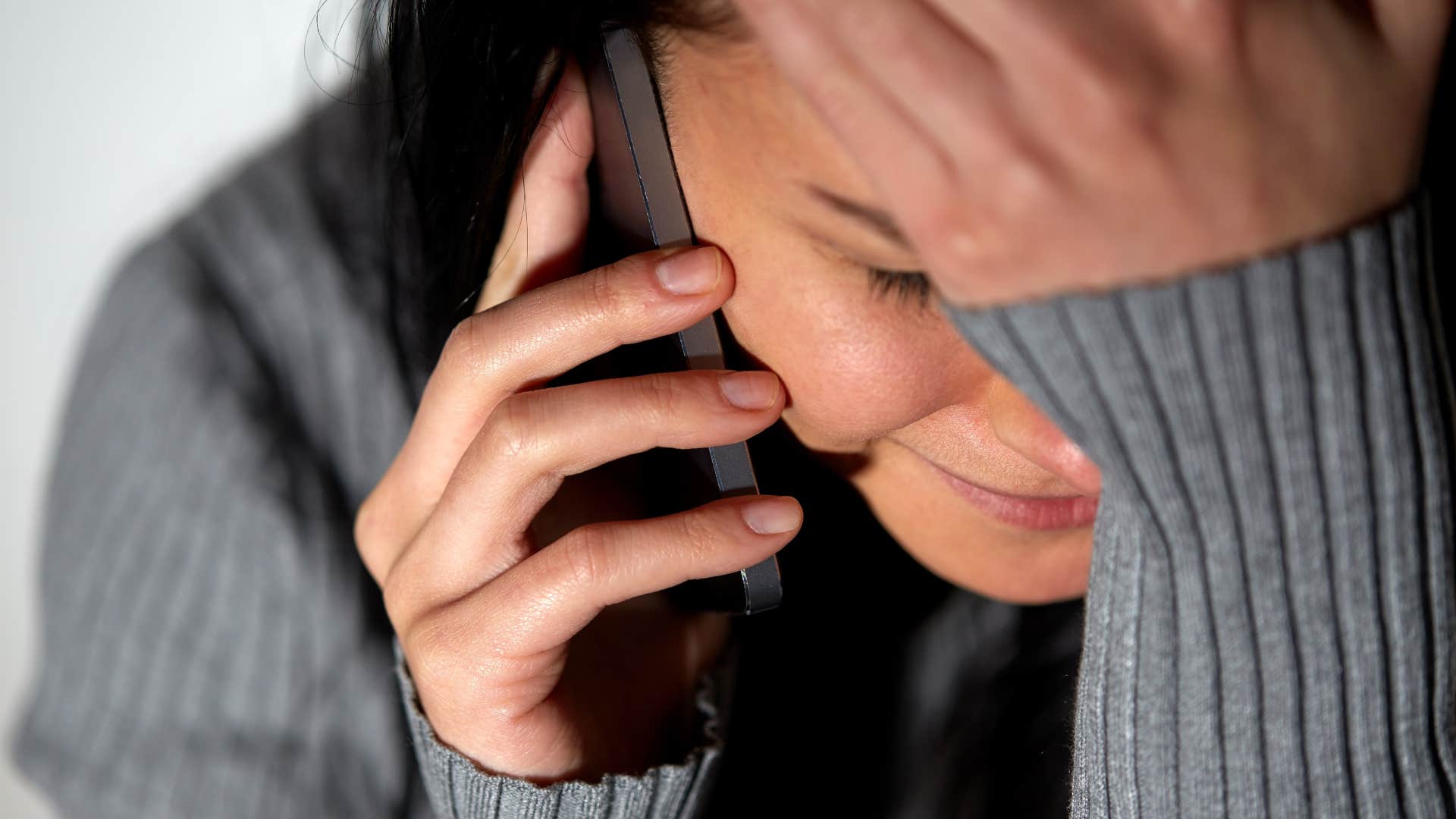People Who Hate Talking On The Phone Usually Have These 11 Specific Reasons
Taking a phone call can be intimidating for some people.
 carballo / Shutterstock
carballo / Shutterstock Many people hate talking on the phone and will choose to text no matter what. These people tend to have their own reasons for not wanting to talk on the phone. These reasons range from anxiety to personality reasons, and the potential inconvenience it can be for other people.
Overthinking what can be a simple phone call leads these individuals to believe that by making a phone call, they are likely taking up too much of someone else’s time, and they worry that they will not perform to the other person’s standards. This makes it more and more difficult for someone to embrace talking on the phone without feeling uncomfortable while doing so.
People who hate talking on the phone usually have these 11 specific reasons
1. Phone anxiety
 fizkes / Shutterstock
fizkes / Shutterstock
People who hate talking on the phone have their reasons for hating it. One of these reasons could be that whenever they talk on the phone, they get phone anxiety.
There are many reasons why someone might feel anxiety while talking on the phone. Not having the ability to pick up on visual cues or already having existing social anxiety can both lead an individual to have difficulty answering a phone call, especially when it is unexpected.
2. Fear of being judged
 fizkes / Shutterstock
fizkes / Shutterstock
Sometimes people struggle with talking on the phone because they are unsure of how others may perceive them. This fear of being judged sends them down a rabbit hole of wondering whether or not making the call is the best thing to do.
“Phone anxiety, like other forms of social anxiety, is often about the person on the other end of the line. Phone anxiety often occurs because of the fear of judgment. Will the call recipient be bothered and thus annoyed? Worries about saying the wrong thing or being unable to explain something clearly, resulting in a negative judgment, can prevent someone from using the phone,” explains Tanya J. Peterson, a national certified counselor as well as a diplomate of the American Institute of Stress.
3. Need for self-editing
 Marjan Apostolovic / Shutterstock
Marjan Apostolovic / Shutterstock
Most people will always choose to send a quick text message rather than call someone. This allows them to carefully curate exactly what they want to say and edit themselves as much as they’d like to. This need for self-editing is a main reason why many individuals hate talking on the phone.
“With email, text and other app messaging services, time is on your side. You don’t always have to respond right away, you can take time to choose your words carefully and consider the other person’s response before finalizing the message and sending it. In real time, self-editing doesn’t contribute positively to an interaction where confidence may be key. There’s no backspace in a phone conversation — you may be able to dance around the supposed mistake, but you can’t outright delete it,” explains Madison Marcus-Paddison, a licensed social worker.
This can be terrifying for someone who perhaps lacks self-confidence and struggles with managing their mistakes.
4. Performance pressure
 Hananeko_Studio / Shutterstock
Hananeko_Studio / Shutterstock
A common reason most people hate to talk on the phone is due to performance pressure and anxiety. They develop a fear of the unknown and not knowing if they can perform in a manner that allows them to be perceived in the most positive way.
While affecting around 20% of Americans, performance pressure and anxiety cause people to fear the way they will be perceived while having a real-time interaction. They are aware that they cannot change anything that they say during the interaction, and not knowing how this will be evaluated causes them to avoid phone calls as much as they can.
5. Awkward silences
 ElenaYakimova / Shutterstock
ElenaYakimova / Shutterstock
A phone call takes away the ability to observe visual cues. When there are awkward silences, there is no room to fill these gaps with nonverbal communication. This causes many people to fear and avoid phone calls.
“When texting, if you run out of things to say, or are unsure of how to respond, you can simply stop replying. This option doesn’t exist when talking to someone over the phone. Many people feel the need to try to keep conversations going, but when they inevitably fade, and periods of silence develop, some may begin to feel uncomfortable as awkwardness ensues,” according to Hoopis Performance Network, a company devoted to providing knowledge and skills training for individuals in the financial services industry.
6. Unpredictable interruptions
 Prostock-studio / Shutterstock
Prostock-studio / Shutterstock
A phone call can be much more unpredictable than a text message. Many individuals who hate phone calls typically feel this way about them because they can include unpredictable interruptions.
Phone calls demand immediate reactions, and for someone who hates them, they know that they will have to pull together their thoughts in a quick manner. However, even after having a response ready to go, the person on the other end of the phone may change the subject quickly, interrupting their train of thought and making it even more difficult for them to manage the immediate nature of the phone call.
7. Absence of body language
 Victoria Labadie / Shutterstock
Victoria Labadie / Shutterstock
While talking to someone in person, much of the communication happening is nonverbal. Through body language and visual cues, people are able to pick up on the way a certain topic is making someone feel and whether or not the topic is engaging for both parties.
Phone calls create an absence of body language, and for this reason, many people dislike talking on the phone. This lack of social cues also makes it difficult to know when pauses are needed in the conversation and can lead to misinterpretations about how invested each person is in the phone call.
8. Feeling put on the spot
 voronaman / Shutterstock
voronaman / Shutterstock
A phone call typically puts both parties involved on the spot. They don't give people time to think about what to say or how to respond to certain things, which can make many people dread talking on the phone.
Nicholas Farrell, Ph.D., a licensed psychologist, explains that many individuals may hate phone calls because “Phone calls require real-time responses that leave little room for the measured contemplation that texts or emails allow. This can be daunting if you prefer to craft your communications carefully.”
9. Vulnerability
 Ground Picture / Shutterstock
Ground Picture / Shutterstock
Phone calls can make a person feel very vulnerable. They do not have the luxury of observing nonverbal social cues, which could give them insight into whether or not they are being judged throughout the interaction. This can cause many people to hate talking on the phone.
Not truly knowing what someone’s reaction is to what they are saying can leave them in a very vulnerable state and can cause their fear of judgment to only grow. Even if the other person isn’t, they may start to feel like every word they say is being judged, and it can cause them to shut down and avoid taking phone calls.
10. Small talk is draining
 Krakenimages.com / Shutterstock
Krakenimages.com / Shutterstock
Some people dislike talking on the phone for reasons that are not due to a self-esteem-related fear. Small talk can be draining for some individuals, and it can make them avoid phone calls.
Some people prefer the majority of their conversations to be dedicated to deep and meaningful topics. If they feel that the small talk that usually consumes most phone calls is inauthentic, they will be less likely to want to commit time to making and taking phone calls.
11. Introversion
 Krakenimages.com / Shutterstock
Krakenimages.com / Shutterstock
Many people who are introverted tend to hate talking on the phone. Introverts tend to feel drained from social interactions and may find it nerve-wracking to engage in interactions that are not accompanied by nonverbal cues and body language.
“Non-verbal communication, also known as body language, is incredibly important in conversations. Introverts rely heavily on observation skills, and not being able to see our conversation partner can add a layer of frustration,” explains Introvert, Dear, an award-winning community for introverts.
If someone sincerely hates talking on the phone, all of these specific reasons could be why.
Kamryn Idol is a writer with a bachelor's degree in media and journalism who covers lifestyle, relationship, family, and wellness topics.

